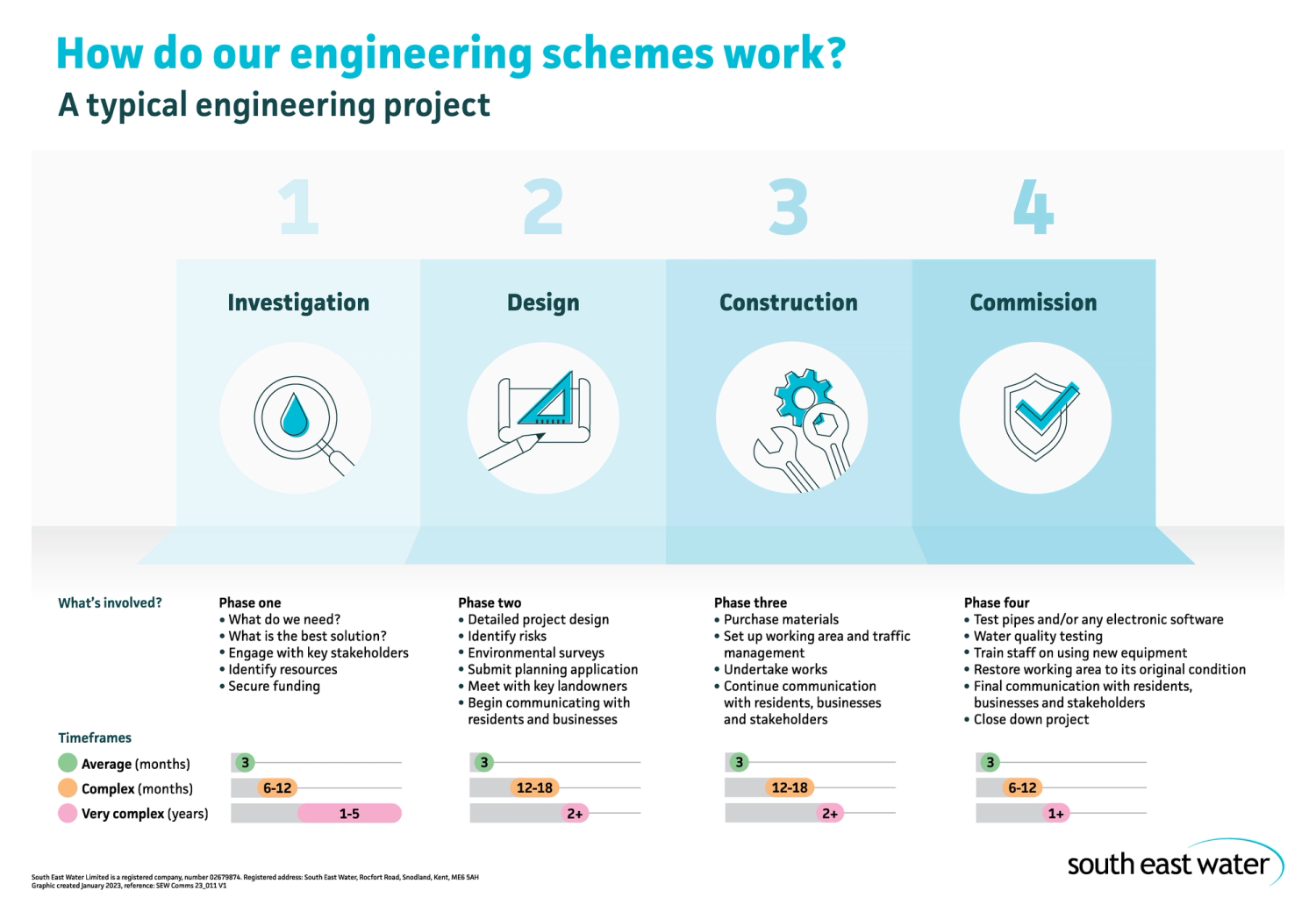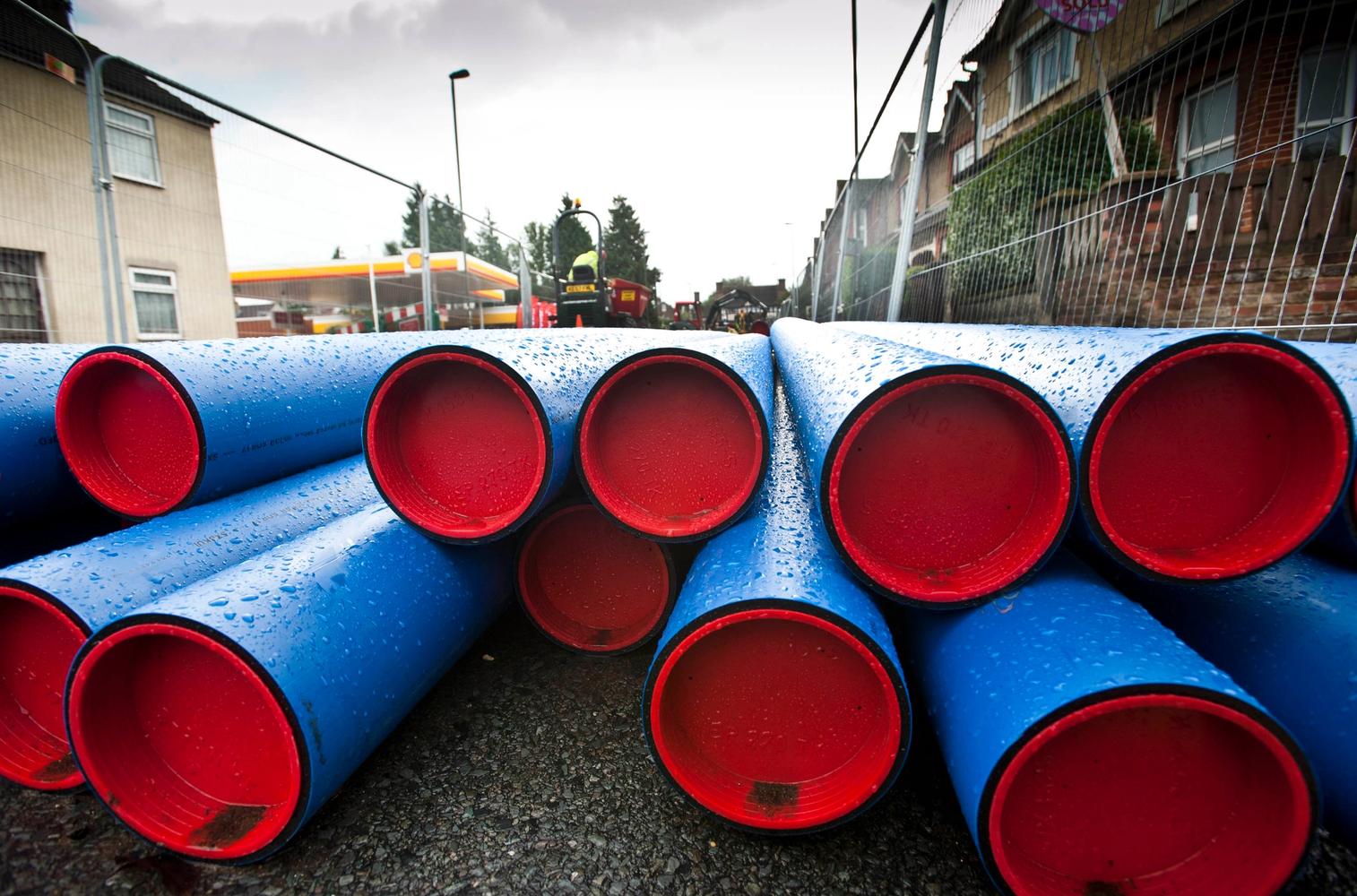We're committed to providing you with clean, fresh drinking water 24/7. That's why we've invested over £567 million between 2020 and 2025 to upgrade our water pipes, treatment works, and reservoirs.
Some of this work happens at our sites, but a lot takes place on roads and in public areas. We work with specialist contractors like Clancy, who help us plan and lay pipework in the roads.

Work in your area
To find out more about work in your area, you can:
- Visit our interactive map(opens in a new tab).
Just enter your postcode to see planned work and any potential interruptions to your water supply.
- See our website for the latest projects.
We manage 14,500km of water pipes, which bring water to homes and businesses across our region. We know roadworks can be frustrating, so we always aim to finish our projects as quickly as possible.
Your safety is our top priority. We work closely with local councils to manage traffic safely during roadworks. This might include signs, traffic lights, and road closures.
We'll always try to write to residents and businesses who might be affected by our work. These letters give specific information about the planned work. For bigger projects, we hold drop-in sessions for residents, work with local councils, and create webpages with project updates. We also attend local events and talks to keep communities informed.

Do you run a business?
We try to work with businesses affected by our works to reduce their impact. However, if you are affected directly by one of our projects, you may be able to claim compensation. To make a claim, please complete our online form here(opens in a new tab).
Please note that compensation will only be considered for businesses affected by our long-term projects. For any unplanned interruptions, such as those caused by a burst main or routine maintenance work, we recommend contacting your own insurers for potential compensation, as South East Water is not liable in these instances.
You can find helpful information for making a claim here(opens in a new tab).
Yes, you'll always be able to walk to your property, but you might have to wait a few minutes for our contractors to make it safe to cross.
We'll make sure you can drive to your property as soon as possible.
Yes, we tell the emergency services about road closures and diversions in advance, and we always make sure they can get through.
Sometimes we need to turn off your water supply, for example when connecting new pipes. If we need to do this, we'll write to you in advance.
We contact bus companies if our work affects their routes. They will then tell their customers about any diversions or changes to bus stops.
We work hard to minimise disruption to businesses during our work. Our engineers and contractors talk to businesses to make sure deliveries can get through and customers can still access shops and restaurants.
If our work does affect your business, you can claim for any losses.
Please complete our online claim form here(opens in a new tab).
Please note that compensation will only be considered for businesses affected by our long-term projects. For any unplanned interruptions, such as those caused by a burst main or routine maintenance work, we recommend contacting your own insurers for potential compensation, as South East Water is not liable in these instances.
Our contractors will let delivery drivers get to your property whenever possible. Sometimes, they'll set up a dedicated parcel delivery point. If this happens, we'll let you know in the letter we send you.
If you're moving home, please talk to our contractors on site or contact us directly. We'll do our best to help the removal van get to your property.
Please put your bins out as usual. Our contractors will work with the refuse collectors to get your bins emptied.
We'll clearly signpost any alternative pavements and road crossings, and they will be safe to use.
We can help if you always need a water supply for medical or other reasons. We recommend signing up for our Priority Services Register, which offers a range of free benefits.
Yes, we always fix the road, pavements, and verges after we finish our work. Sometimes, fixing the verges depends on the weather or time of year, but they will return to normal over time.
To keep everyone safe, we might need to use temporary traffic lights or close the road.
We decide this with the local council. If we close a road, we'll agree diversion routes with the council and clearly signpost them. The letter we send you explains what we're doing for the specific project.
We work with the local council and our contractors to put up clear signs about roadworks.
These signs tell road users about the work, diversion routes, and whether businesses are open as usual.
We need permission from the local council to do roadworks. They give us a licence for specific work at a specific place for a set amount of time.
Once we have permission, we write to everyone who needs to know about the work, including local councils and the local MP, before we start.
Sometimes we hold informal drop-in sessions where you can talk to our engineers about a project.
If we're doing this, we'll tell you about it in the letter we send you.
Depending on the work, we might advertise on local radio or in the media. We might also issue press releases explaining what we're doing and how long it will take.
We have a legal duty to maintain a reliable water supply.
Most of the water pipes are under roads, pavements, and verges, so we need to dig them up sometimes to do our work.
(a) For providing supplies of water to premises in that area and for making such supplies available to persons who demand them; and
(b) For maintaining, improving and extending the water mains and other pipes, as are necessary for securing that the company is and continues to be able to meet its obligations.
Most of the water supply network is laid in roads, pavements and verges and also in private land where we have special powers to undertake work.
